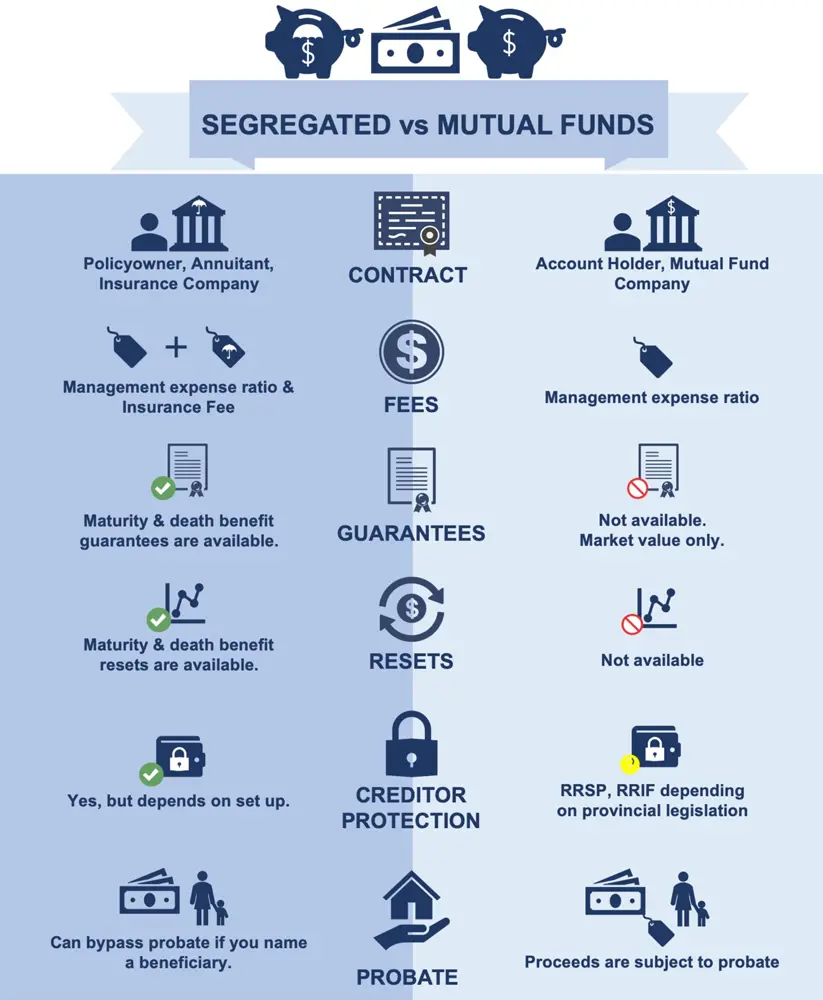Mutual Funds
Simple, Smart, and Diversified Investing
Grow Together — Invest Once, Own Many.
What Are Mutual Funds?
A mutual fund is an investment vehicle that pools money from many investors to buy a diversified portfolio of stocks, bonds, or other securities.
Each investor owns units or shares of the fund, and the value of those units rises or falls with the underlying investments.
Key features:
- Professional management (portfolio managers decide what to buy/sell).
- Diversification: you get exposure to many assets rather than just holding a few.
- Liquidity: you can redeem units (sell your share) generally at any time at the current market value.
- Fees: management expense ratios (MERs), sometimes sales charges (front load/back load), etc.
- Tax treatment depends on account type (registered vs non-registered).

What Are Segregated Funds?
Segregated funds (also called “seg funds” or “Guaranteed Investment Funds” by some insurers) combine investment fund features with an insurance contract. They are offered exclusively by life insurance companies and provide certain guarantees and protections that traditional mutual funds do not typically offer.
Key features:
- Guarantees: A portion (often 75% or 100%) of your principal investment is guaranteed at maturity or upon death. Even if markets perform poorly, you will still receive at least the guaranteed amount.
- Death benefit: A named beneficiary receives either the market value or the guaranteed amount—whichever is greater.
- Resets: Some segregated funds allow you to “reset” your guarantee to lock in higher market values on specific dates.
- Estate & Creditor Protection:Because they are insurance contracts, segregated funds may bypass probate (allowing faster payouts to beneficiaries) and, under certain conditions, offer protection from creditors.


Mutual Funds vs Segregated Funds — Key Differences
| Feature | Mutual Funds | Segregated Funds |
|---|---|---|
| Guarantees on principal | None — value depends entirely on market performance. | Often 75-100% guarantee at death or
maturity. Downside risk is lower |
| Death benefit / beneficiary designation |
Proceeds flow through the estate unless specific ownership or beneficiary arrangements are made. May be subject to probate. | A named beneficiary receives the payout, potentially bypassing the estate and probate. |
| Creditor protection | Generally limited or none (depends on account type and jurisdiction). |
Possible, especially with proper beneficiary designation. Useful for business owners. |
| Fee structure | Usually lower fees (no insurance guarantees). Some funds may be more expensive depending on strategy. |
Higher costs, since you’re paying for insurance guarantees, resets, death benefits, etc. |
| Flexibility / Liquidity | Highly flexible easy to redeem units and choose from many funds. |
Also redeemable, but to benefit from guarantees you may need to hold until maturity or meet certain conditions (e.g., resets). Early withdrawals may reduce the guarantee. |
| Estate & succession planning | Possible, but may require proper beneficiary designations and can be delayed by probate. | Stronger advantages: named beneficiary, insurance structure often bypasses probate, allowing faster payout. |
WHEN TO USE WHICH — MATCHING TO YOUR GOALS
A quick comparison based on what matters most to you.
MUTUAL FUNDS

You want maximum growth and can handle volatility.
Ideal for long-term investors seeking low fees and simplicity.

You care about growth for your beneficiaries, but want easy estate handling and low cost.

You’re focused on performance and liquidity over legal protection.

Need flexibility — withdraw anytime without affecting returns.

Lower MER, cost-efficient option.
SEGREGATED FUNDS

You want market protection with downside safety.
Ideal for cautious investors wanting guarantees.

You care about your beneficiaries getting guaranteed payouts, bypassing probate.

You’re a business owner worried about lawsuits or creditor claims.

Early withdrawals may reduce guarantees or trigger penalties.

Higher MER — you pay premium for insurance & guarantees.

Understand the trade-offs — Mutual funds focus on growth and flexibility.
Segregated funds focus on protection and legacy. Choose based on your *risk comfort, time horizon,* and *peace of mind.*

What Impacts Cost & Returns
-
Management Fees (MERs)
Segregated funds generally have higher Management Expense Ratios (MERs) because they include an insurance component in addition to standard management and administrative costs. -
Cost of Insurance Guarantees
Guarantees that protect 75% to 100% of your investment come with added costs. Choosing higher guarantee levels or more frequent resets will increase these expenses accordingly. -
Early Withdrawal or Surrender Charges
With segregated funds, withdrawing before the maturity date—or before meeting specific conditions—may result in surrender charges or a reduction of your guarantee. -
Investment Strategy
The investment approach—whether aggressive or conservative—affects both the cost and potential returns of mutual and segregated funds. -
Tax Treatment
Both types of funds are subject to taxes on income and capital gains when held in non-registered accounts. However, they differ in how income and distributions are allocated and reported.

Risks & Things to Watch Out For
-
High Fees Can Reduce Returns
Segregated fund fees and insurance costs can significantly reduce your overall investment returns — particularly over the long term. Always review the MERs and other charges before investing. -
Guarantees Have Conditions
Insurance guarantees apply only if specific conditions are met — such as holding the investment until maturity or adhering to reset rules. Early withdrawals may reduce or void your guarantee. -
Market Risk Still Exists
Even with guarantees, segregated funds remain exposed to market volatility. Guarantees typically exclude fees and sales charges, meaning your total value can still decline. -
Tax Implications Matter
Distributions and allocations from both mutual and segregated funds may be taxable. Investors should understand how to track their Adjusted Cost Base (ACB) to prevent unexpected tax consequences. -
Estate Planning Must Be Done Properly
To receive full estate and beneficiary benefits, all designations must be accurately completed. Errors or missing information can lead to delays or loss of these advantages.

Both mutual and seg funds can be held inside various account types: RRSP, TFSA, RRIF, non-registered.
The account type affects tax treatment of returns, withdrawals, estate issues.

Example Scenarios
- Scenario A – Young Investor (Age 30, Moderate-Risk, Growth Focus)
Jane is 30 and plans to invest $50,000 for 20 years. She’s not worried about death benefit or probate; wants growth, lower fees.
Mutual funds (growth-oriented) are likely more cost-efficient for her.
- Scenario B – Business Owner Concerned About Creditor Risk
Mark owns a business; wants to invest some profits but protect them from personal or business liability. He invests part in segregated funds with named beneficiaries so that portion bypasses probate and may be shielded from creditor claims.
- Scenario C — Business Owner
Susan is 60. She wants to invest but cannot afford major dips in portfolio. A mix: mutual funds for growth and seg funds for portion with guarantees so part of her investment is protected and can be passed to heirs smoothly.
- Frequently Asked Questions
Is a guaranteed principal 100 % always “free”?
No — higher guarantee usually means higher fees or lower net returns.
Sometimes the guarantee applies only at death or at maturity; if you sell earlier, you may not get full guarantee.
Can I have both in my portfolio?
Yes — many investors use a mix: seg funds for guaranteed portions/estate planning needs, mutual funds for growth. Diversification is key.
Are segregated funds right for everyone?
Not necessarily. If you don’t need guarantees, probate bypass, or creditor protection, the extra costs might outweigh benefits.
For some, mutual funds are more than sufficient.
Do segregated funds count as insurance?
Yes — they are insurance contracts. That’s why they have insurance features (death benefit, guarantees) and are governed under insurance regulations.
How are taxes handled differently?
Differences show up in how distributions/allocations are treated; how capital gains/losses are reported; how adjusted cost base (ACB) is tracked.
Sometimes seg funds allocate income without reducing unit value; mutual funds distribute (which can change unit value).
How We Help
1 - Smart Fund Selection
We help you choose the right balance of mutual and segregated funds that fits your financial goals, time horizon, and risk tolerance.
2 - Value Comparison Across Providers
We compare management fees, guarantees, reset options, and estate-planning features from multiple companies to ensure you get the best overall value.
3 - Proper Legal & Beneficiary Setup
We make sure beneficiaries are correctly named and all documentation is legally sound, so you can maximize the estate and creditor protection benefits of segregated funds.
4 - Ongoing Portfolio Review
We regularly review your portfolio at key milestones — approaching retirement, growing assets, or major life events like marriage, inheritance, or selling a business — to keep your plan on track.
Invest with confidence.
Whether you're chasing growth, protection, or both — there’s a fund
strategy for you.
we’ll map out mutual + seg funds mix suited to your goals.
